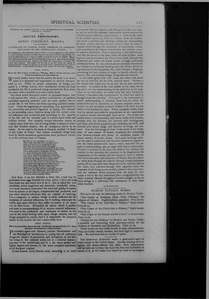Keeping up Appearance
...
Inlay

Ancient Theosophy; or Spiritism in the Past
As the Indian canoe gives place to the Atlantic screw steamer, so by the law of growth and decay in all nature there is nothing lost. There is simply a new conservation of forces. As the earth revolving on its Awn axis evolves light for some and darkness for others, so by the turn of the whirligig is evolved civilization for some and barbarism for others. So with the ancients we are now studying; so with ourselves, as Louis Jacolliot points out:—
“In the same manner as modern society jostles antiquity at each step—as our poets have copied Homer and Virgil, Sophocles and Euripides, Plautus and Terence; as our philosophers have drawn inspiration from Socrates, Pythagoras, Plato, and Aristotle; as our historians take Titus Livius, Sallust, or Tacitus as models; our orators Demosthenes or: Cicero; our physicians study Hyppocrates, and our codas transcribe Justinian—so had antiquity’s self also an antiquity to study, to imitate, and to copy.
Rise and Decay, Decay and Rise! From caterpillar to chrysalis, from chrysalis to butterfly, from butterfly to caterpillar interminably. Where are the developments of the lost arts and sciences? where of the old civilizations of Asia, of Carthage, of Memphis, which have each given way to others to replace them again in the ages.
“Westwards the course of empire wings its way,” and eastwards Russia looms ahead to plunge all perhaps into the barbarism of Cossack state, as the Huns, Goths, and Vandals, making way for exotericised Christianity which cast Europe from the heights of Roman civilization into the depths of centuries of darkness she is gradually creeping from. Perhaps four thousand years hence, in the “Martyrdom of Man,” the master race of the future will be the African again, and the Caucasian be transformed into the earth-eater.
The mysteries of the ancient Esoteric doctrines are synonymous in the minds of many with flagrant debauchery, owing to the fact that Christian writers like Justin Martyr or Tertullian turned on their accusers with a Tu quoque when their own Agapal were attacked. That many instances did occur when perhaps some breach of decorum happened is possible, but we should remember that old Hornie “is not so black as he is painted.” They are simply on a par with the stories concocted of the Hindoos and their ceremonies by their descendants, the Christian missionaries of to-day, who should look at home, and scent the sweet odors wafted from Plymouth.
“Let those who are without sin first cast the stone,” and let us beware of Christian Sacerdotalism, beckoning with blood be-dabbled hands reeking with the crimes of centuries.
Beware of Christian Ultramontanism, crushing out the intellect and sapping the life blood of humanity; gagging the mouth of Freedom in the folds of her priestly robes.
And in the words of another:—
“Let us beware; the times of Brahminism, of Sacerdotalism, of Levitism, in India, in Egypt, in Judea, present nothing to compare with the flames of the Inquisition, the Vaudois massacres, or St. Bartholomew’s, for which Rome made St. Peter’s resound with a Te Deum of exultation.
“Henry of Germany. Emperor and King, passing three days with his feet in the snow, his head bowed down under the vulgar hand of a fanatic priest, had no parallel midst votaries of Brahma, of Isis, or of Jehovah. Let us beware.”
Beware of all this; and, I say, from contemplating the Christian past, regard the Essenian initiate of Nazareth walking in the cornfields with the humble fishermen, his companions, and teaching abnegation—the acme of philosophy— and then look at the defilement in that sacred spot of antiquity—
“Where Cicero and Antonius lived, |
As the Mahommedan guard in charge of the Holy Sepulchre keeps the peace Between Greek and Latin monks ready to tear each other’s hearts out, so does Spiritism at this moment stand holding the balance between the two hundred million Roman Catholic and the two hundred million Oriental and Protestant Christians, trembling at the next innovation of modern science, justly opposed to the Bucherian clap-trap of Sankey-drome leaders.
As true science is not opposed to true religion, so are both not opposed to Theosophic Spiritism; but all these have to fear the dilletante dabblers only apprehending half truths. Let us have more science and more rational religion, commingle the elements, and integralise exact modern wisdom with ancient knowledge, which never dogmatises, but leaves to their fanatical half-fledged followers.
Theosophic Spiritism is now, and ever must be, a power for the good of the race, for men to-day. as in the early ages, are—
“Convinced that the most perfect half, the real man, had originated in the world of spirits, and that he derived from it his vital energies, being as little able to sever himself from its influence as the bough from the tree stem, or the stem from its roots. According to this innate theosophical belief, we find in all nations and in all ages the most deep rooted belief, or at least a conception of such a spiritual relationship, and the desire of communicating with celestial things.”
Theosophic Spiritism is no geological fossil to be classed with the mastodon and ichthyosanrus, but a living power by which—
“Man may become, by the assistance and co-operation of spiritual powers, and the capacities of his higher divine origin, capable of a higher sphere of activity, as well without as within himself, which gives him dominion over his own, and over surrounding nature.”
With such knowledge in common, a band of union has in all ages united Theosophists, and so humanity; for with them virtue was a truism and truth an aphorism. Through this simple belief we can realize why the Mystics or Theosophists were far from unpracticable. As the late Charles Kingsley tells us—
“If we look faithfully into the meaning of their name, we shall see why, for good or for evil, they cannot be unpractical; why they, let them be the most self-absorbed of recluses, are the very men who sow the seeds of great schools, great national and political movements, even great religions.”
All is dark and drear around; for the atheist stalks abroad and defies the innate perceptions mysteriously placed in the intelligence of the race. The highest point apprehended by the keenest of mathematicians, Herbert Spencer, is the “Unknowable,” and the greatest progress of modern science is the incompatibility expressed by the Tyndalian “Incomprehensibility.”
With men like those Bishop Temple describes, and to whom—
“Truth often seems to him richer and fuller when expressed in some favorite phrase of his mother’s or some maxim of his father’s. He can give no better reason, very often, for much that he does every day of his life, than that his father did it before him; and provided the custom is not a bad one, the reason is valid. And he likes to go to the same church; he likes to use the same prayers; he likes to keep up the same festivities.”
For such as these, the barren fig trees of Paley and Spinoza are worthless, and with such the words of the Hindoo conception put into the mouth of Christna— “The infinite and the boundless can alone comprehend the boundless and the infinite, God only can comprehend God,”—is a reasonable excuse.
Humanity must prepare for its future destiny, and accept the “Father of all in every clime” to be adored by the “Coming Race.”
With everything material around the inhabitants of cities their spiritual life is killed. The race requires solid sustenance in order to comprehend between body and spirit; for as with the philosopher, so with the peasant, and to few are given the apprehension which Emerson so beautifully explains:—
“We cannot describe the natural history of the soul, but we know that it is divine. All things are known to the soul. It is not to be surprised by any communication. Nothing can be greater than it, let those fear and those fawn who will. The soul is in her native realm; and it is wider than space, older than time, wide as hope, rich as love. Pusillanimity and fear she refuses with a beautiful scorn. They are not for her who putteth on her coronation robes, and goes oat through universal love to universal power."
Yes, the Spirit Soul which, disengaged of its cumbrous envelope will re-wing its way to the better and purer regions whence it came. Onwards, onwards, onwards—Excelsior.
Editor's notes
Sources
-
Spiritual Scientist, v. 4, No. 10, May 11, 1876, p. 116


